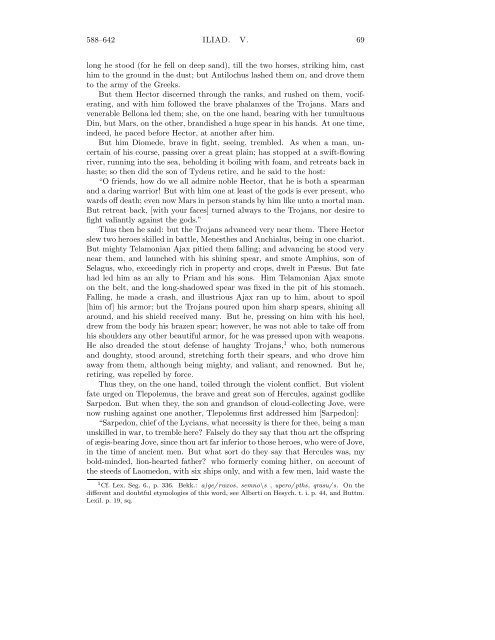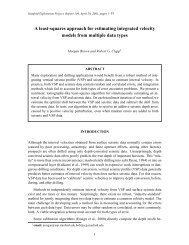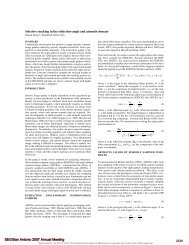The Project Gutenberg Etext of the Iliad of - Stanford Exploration ...
The Project Gutenberg Etext of the Iliad of - Stanford Exploration ...
The Project Gutenberg Etext of the Iliad of - Stanford Exploration ...
You also want an ePaper? Increase the reach of your titles
YUMPU automatically turns print PDFs into web optimized ePapers that Google loves.
588–642 ILIAD. V. 69<br />
long he stood (for he fell on deep sand), till <strong>the</strong> two horses, striking him, cast<br />
him to <strong>the</strong> ground in <strong>the</strong> dust; but Antilochus lashed <strong>the</strong>m on, and drove <strong>the</strong>m<br />
to <strong>the</strong> army <strong>of</strong> <strong>the</strong> Greeks.<br />
But <strong>the</strong>m Hector discerned through <strong>the</strong> ranks, and rushed on <strong>the</strong>m, vociferating,<br />
and with him followed <strong>the</strong> brave phalanxes <strong>of</strong> <strong>the</strong> Trojans. Mars and<br />
venerable Bellona led <strong>the</strong>m; she, on <strong>the</strong> one hand, bearing with her tumultuous<br />
Din, but Mars, on <strong>the</strong> o<strong>the</strong>r, brandished a huge spear in his hands. At one time,<br />
indeed, he paced before Hector, at ano<strong>the</strong>r after him.<br />
But him Diomede, brave in fight, seeing, trembled. As when a man, uncertain<br />
<strong>of</strong> his course, passing over a great plain; has stopped at a swift-flowing<br />
river, running into <strong>the</strong> sea, beholding it boiling with foam, and retreats back in<br />
haste; so <strong>the</strong>n did <strong>the</strong> son <strong>of</strong> Tydeus retire, and he said to <strong>the</strong> host:<br />
“O friends, how do we all admire noble Hector, that he is both a spearman<br />
and a daring warrior! But with him one at least <strong>of</strong> <strong>the</strong> gods is ever present, who<br />
wards <strong>of</strong>f death; even now Mars in person stands by him like unto a mortal man.<br />
But retreat back, [with your faces] turned always to <strong>the</strong> Trojans, nor desire to<br />
fight valiantly against <strong>the</strong> gods.”<br />
Thus <strong>the</strong>n he said: but <strong>the</strong> Trojans advanced very near <strong>the</strong>m. <strong>The</strong>re Hector<br />
slew two heroes skilled in battle, Menes<strong>the</strong>s and Anchialus, being in one chariot.<br />
But mighty Telamonian Ajax pitied <strong>the</strong>m falling; and advancing he stood very<br />
near <strong>the</strong>m, and launched with his shining spear, and smote Amphius, son <strong>of</strong><br />
Selagus, who, exceedingly rich in property and crops, dwelt in Pæsus. But fate<br />
had led him as an ally to Priam and his sons. Him Telamonian Ajax smote<br />
on <strong>the</strong> belt, and <strong>the</strong> long-shadowed spear was fixed in <strong>the</strong> pit <strong>of</strong> his stomach.<br />
Falling, he made a crash, and illustrious Ajax ran up to him, about to spoil<br />
[him <strong>of</strong>] his armor; but <strong>the</strong> Trojans poured upon him sharp spears, shining all<br />
around, and his shield received many. But he, pressing on him with his heel,<br />
drew from <strong>the</strong> body his brazen spear; however, he was not able to take <strong>of</strong>f from<br />
his shoulders any o<strong>the</strong>r beautiful armor, for he was pressed upon with weapons.<br />
He also dreaded <strong>the</strong> stout defense <strong>of</strong> haughty Trojans, 1 who, both numerous<br />
and doughty, stood around, stretching forth <strong>the</strong>ir spears, and who drove him<br />
away from <strong>the</strong>m, although being mighty, and valiant, and renowned. But he,<br />
retiring, was repelled by force.<br />
Thus <strong>the</strong>y, on <strong>the</strong> one hand, toiled through <strong>the</strong> violent conflict. But violent<br />
fate urged on Tlepolemus, <strong>the</strong> brave and great son <strong>of</strong> Hercules, against godlike<br />
Sarpedon. But when <strong>the</strong>y, <strong>the</strong> son and grandson <strong>of</strong> cloud-collecting Jove, were<br />
now rushing against one ano<strong>the</strong>r, Tlepolemus first addressed him [Sarpedon]:<br />
“Sarpedon, chief <strong>of</strong> <strong>the</strong> Lycians, what necessity is <strong>the</strong>re for <strong>the</strong>e, being a man<br />
unskilled in war, to tremble here? Falsely do <strong>the</strong>y say that thou art <strong>the</strong> <strong>of</strong>fspring<br />
<strong>of</strong> ægis-bearing Jove, since thou art far inferior to those heroes, who were <strong>of</strong> Jove,<br />
in <strong>the</strong> time <strong>of</strong> ancient men. But what sort do <strong>the</strong>y say that Hercules was, my<br />
bold-minded, lion-hearted fa<strong>the</strong>r? who formerly coming hi<strong>the</strong>r, on account <strong>of</strong><br />
<strong>the</strong> steeds <strong>of</strong> Laomedon, with six ships only, and with a few men, laid waste <strong>the</strong><br />
1 Cf. Lex. Seg. 6., p. 336. Bekk.: a)ge/ rwxos, semno\s , upero/ pths, qrasu/ s. On <strong>the</strong><br />
different and doubtful etymologies <strong>of</strong> this word, see Alberti on Hesych. t. i. p. 44, and Buttm.<br />
Lexil. p. 19, sq.







